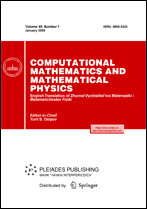|
This article is cited in 2 scientific papers (total in 2 papers)
Optimal control
Analysis of an optimization method for solving the problem of complex heat transfer with Cauchy boundary conditions
P. R. Meseneva, A. Yu. Chebotarevab
a Regional Scientific and Educational Mathematical Center "Far Eastern Center for Mathematical Research", 690922, Vladivostok, Russia
b Institute of Applied Mathematics, Far Eastern Branch, Russian Academy of Sciences, 690041, Vladivostok, Russia
Abstract:
An optimization method is proposed for solving a boundary value problem with Cauchy conditions for the equations of radiative-conductive heat transfer in the $P_1$-approximation of the radiative transfer equation. Theoretical analysis of the corresponding problem of boundary optimal control is carried out. It is shown that a sequence of solutions of extremal problems converges to the solution of the boundary value problem with the Cauchy conditions for temperature. The results of theoretical analysis are illustrated with numerical examples.
Key words:
equations of radiative-conductive heat transfer, diffusion approximation, optimal control problem, Cauchy conditions.
Received: 07.03.2021
Revised: 17.09.2021
Accepted: 17.09.2021
Citation:
P. R. Mesenev, A. Yu. Chebotarev, “Analysis of an optimization method for solving the problem of complex heat transfer with Cauchy boundary conditions”, Zh. Vychisl. Mat. Mat. Fiz., 62:1 (2022), 36–44; Comput. Math. Math. Phys., 62:1 (2022), 33–41
Linking options:
https://www.mathnet.ru/eng/zvmmf11343 https://www.mathnet.ru/eng/zvmmf/v62/i1/p36
|


|





 Contact us:
Contact us: Terms of Use
Terms of Use
 Registration to the website
Registration to the website Logotypes
Logotypes








 Citation in format
Citation in format 
